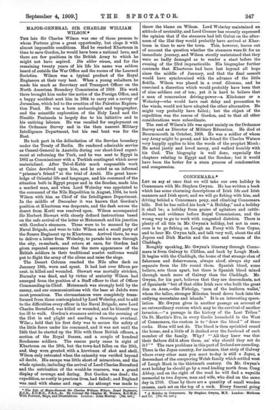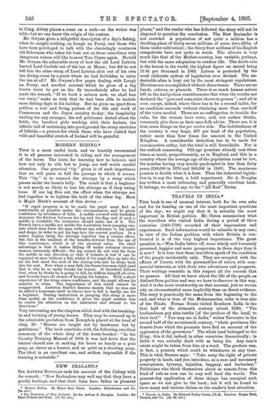CONNEMARA.*
LET us say at once that we will take our own holiday in Connemara with Mr. Stephen Gwynn. He has written a book which has some charming descriptions of Irish life and Irish manners and Irish sport, and we will go fishing with him, and driving behind a Connemara pony, and climbing Connemara hills. But he has called his book "A Holiday," and a holiday it shall be ; a holiday from praise of agitators and cattle- drivers, and evidence before Royal Commissions, and the wrong way to go to work with congested districts. There is plenty of all this in Mr. Gwynn's holiday, but not in ours ; ours is to go fishing on Lough na. Fooey with Tom Coyne, and to hear Mr. Gwynn talk, and talk very well, about the old Joyces and Dick Martin and the men and women of the Claddagh.
Roughly speaking, Mr. Gwynn's itinerary through Conne- mara is from Galway to Clifden, and back by Lough Mask. It begins with the Claddagh, the home of that strange clan of fishermen and fisherwomen, always aloof, always shy and separate from the life round them. Spanish blood, some believe, sets them apart, but there is Spanish blood mixed through much more of Galway than the Claddagh. Mr. Gwynn, for his part, believes that they are descendants, not of Spaniards "but of that older Irish race who built the great dun on Aran,—the Firbolgs, 'men of the leathern wallet,' whom the taller, stronger Milesian breed drove back into the outlying mountains and islands." It is an interesting specu- lation. Mr. Gwynn gives in another passage an account of an extraordinary custom which may be the survival of another invasion,—" a passage in the history of the Lost Tribes." On St. Martin's Eve, in every Gaelic household in the West of Connemara, the custom is to "draw the blood" of three cocks. Hens will not do. The blood is then sprinkled round the house, and a little of it daubed over the forehead of each member of the family. Why ? " All they knew was that their fathers did it afore them, an' why should they not do it ? ' " The race problems in this part of Ireland are unending. There is the Joyce country, for instance, that strip of Galway where every other man you meet to-day is still a Joyce, a descendant of the conquering Welsh family which settled west of Lough Mask in the thirteenth century. On Mr. Gwynn's next holiday he should go by a road leading north from Cong Abbey, and on the right of the road he will find a wayside memorial to two Joyces, man and wife, who died on the same day in 1708. Close by there are a quantity of small wooden crosses, each set on the top of a rock. Every funeral going
• A Holiday in Connemara, By Stephen Gwynn, M.P. London : Methuen and Co. [10s. 6d. not]
to Con Abbey places a cross on a rock—so the writer was told—but no one knew the origin of the custom.
Mr. Gwynn gives a delightful description of a day's fishing, when he caught nothing, on Lough na Fooey, and those who have been privileged to talk with the charmingly courteous old fisherman who takes his boat out on those sometimes very dangerous waters will like to meet Tom Coyne again. He told Mr. Gwynn the admirable story of how the old Lord Leitrim barred Lord Carlisle out of the inn at Maam ; but did he not tell him the other story, of Lord Leitrim shut out of his own inn dining-room by a guest whom he had forbidden to enter the inn at all P Mr. Gwy-nn's few pages dealing with Lough na Fooey, and another account which he gives of a big brown trout he got on the fly immediately after he had made the remark, "If we hook a salmon now, we shall lose our train," make us wish that he had been able to include more fishing-days in his holiday. But he gives us, apart from politics, a real and living picture of the life and work of Connemara and the Joyce country to-day : the hospitality waiting for any stranger, the red petticoats dotted about the fields, the barefoot girls working with their fathers, the infinite toil of reclaiming into good ground the stony stretches of hillside,—a picture for which those who have visited that wild and beautiful stretch of Ireland will be grateful.







































 Previous page
Previous page